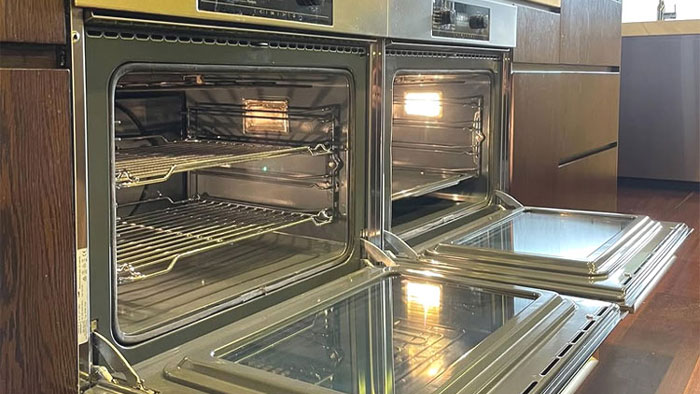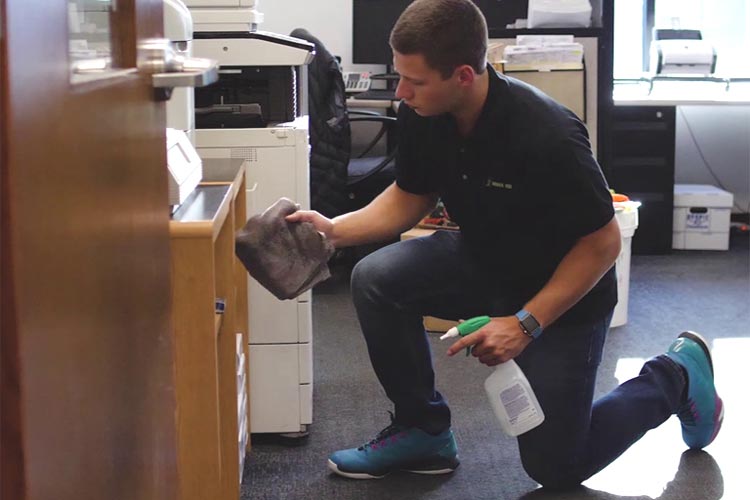Looking after your oven isn’t just about keeping it shiny. It is about getting the best out of it for years to come. A bit of regular care means fewer breakdowns, better cooking results, and more money left in your wallet instead of the repair shop’s till.
Put in the effort now, and your trusty kitchen workhorse will reward you with perfect roasts, golden bakes, and impeccable dinners. These easy habits will help you keep it running like clockwork for a long time.
1. Keep Your Appliance Spotless
A well-maintained oven is essential for a good kitchen environment. It runs better, lasts longer, and doesn’t leave any unsavoury smells in the kitchen.
For stubborn stains, create a simple paste from a tried-and-true DIY cleaner, apply it to the oven walls, and let it sit for several hours.
Next, spray some vinegar inside to create a bit of fizz that helps dissolve the grime. Finally, wipe everything down with a damp cloth. Skip the heavy-duty chemicals, as they’re rarely worth the fumes.
Use oven liners to catch spills and make cleaning easier, and give the door a regular wipe to keep it working properly.
If it is looking beyond DIY help, call in oven cleaning experts. With their industrial gear and know-how, they can get your oven looking and smelling like new without you lifting a finger.
2. Check and Replace the Door Seal
If your oven can’t keep the heat in, you’ll end up with half-cooked dinners and a bigger power bill. A worn-out seal lets the heat slip out, and suddenly nothing cooks quite right.
Have a quick look at the seal every so often. If you spot cracks, frays, or bits that look worse for wear, it is time to swap it out. Replacement seals are easy enough to grab from a hardware store or online, and fitting a new one is usually simple.
You can pick new seals from your local hardware shop or online. In general, after a certain duration, it is advisable to replace old gaskets with new ones.
To keep yours lasting longer, give it a quick wipe with a damp cloth now and then, and always check that the door closes firmly.
Overall, adding this step to your regular oven maintenance routine prevents heat loss and saves on power bills.
3. Use the Cooker Efficiently
Your oven can be a true workhorse, but with a few small changes to the way you use it, you will save energy and end up with food that cooks more evenly and tastes better.
Preheat Less, Cook Smarter
Preheating isn’t always a hard and fast rule. Save it for delicate bakes like cakes or pastries, but for most savoury dishes, you can start with a cold oven and simply adjust the cooking time.
Use the convection setting whenever possible. It circulates heat evenly, reducing cooking time by up to 25% and producing stellar results for pot roasts and casseroles.
For delicate bakes, like soufflé, conventional heating is the preferred method, as it is the only way to get you that admirable even rise, crispy texture, and delicious taste.
Try to resist the temptation to open the oven door, and instead, monitor the food through the glass panel. This is an all-around good practice.
Cook Multiple Dishes at Once
Turn your oven into a multitasker by cooking several dishes at once. Place items on separate racks, leaving space between pans and the oven walls so heat can circulate properly. Keep the door closed to hold the heat.
Choose glass or ceramic cookware for better heat retention, and you could even use the oven’s residual heat to finish cooking when you turn off the oven.
Consider how flavours interact when pairing dishes. Stronger-smelling foods, like fish, can easily overpower milder ones if cooked side by side.
And if the dishes need different cooking times, start the ones that take longer first, then add the quicker ones later so everything finishes together and tastes just right.
Plan Meals Ahead
A little planning goes a long way toward making your oven work smarter, not harder. Look for meals that cook at similar temperatures and line them up to bake together. It saves energy, cuts down on waiting time, and keeps every dish tasting its best.
If you are roasting a chook at 190°C, pop in some spuds, winter veggies, or even a fruit crumble for dessert. They will all cook beautifully at the same heat.
While the food is in the oven, use the downtime to get ahead on tomorrow’s meals. Roast a tray of veg for soup, or toast a batch of nuts for quick snacks later in the week.
When you start thinking about the whole menu rather than one dish at a time, everything comes together more easily. You will spend less time juggling timers and more time enjoying a warm, perfectly coordinated meal.
Do this regularly and you will build up a handy set of go-to pairings and timings that make home cooking simpler.
4. Calibrate Regularly
For reliable cooking results, always double-check your oven’s temperature. Place an oven thermometer inside and compare its reading to the dial setting.
If the numbers don’t match, adjust the controls so the oven lines up with the thermometer. This guarantees that your oven heats evenly and efficiently and saves you from half-baked mishaps.
Check it regularly to avoid wasting food. Don’t forget to consult your appliance manual for tailored guidance. Different ovens heat and behave in their own way, so it is worth knowing how yours is designed to work.
When your cooker runs at the right heat, your meals turn out better, and you will save money by cooking more efficiently.
5. Avoid Overloading
Overloading your oven is a common blunder that hampers cooking efficiency. A crowded oven restricts proper air circulation, causing some portions of food to become overdone whilst others remain raw.
Such uneven cooking spoils your meal and compels the oven to expend additional energy. A practical solution is to prepare food in stages. This method ensures that heat is distributed uniformly and each dish cooks thoroughly.
Pick cookware that fits your oven well. Large trays or bulky pots can block the heat, while the right-sized ones let it move around properly. Give each dish a bit of space so the hot air can circulate.
When the oven is set up this way, it cooks more evenly, works faster, and doesn’t chew through as much power. The result is consistent meals and a few extra dollars saved.
Conclusion
An oven that’s neglected won’t just burn your dinner, it will burn through your power bill, too. A little TLC keeps it humming along and your food coming out golden instead of questionable.
Think of seal checks and smart loading as cheap insurance for stress-free meals. Give these tricks a whirl and let your oven do the heavy lifting while you take the credit for perfectly cooked meals.




